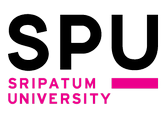Please use this identifier to cite or link to this item:
http://dspace.spu.ac.th/handle/123456789/2109Full metadata record
| DC Field | Value | Language |
|---|---|---|
| dc.contributor.author | Gloria Vidheecharoen | - |
| dc.date.accessioned | 2554-04-20T08:23:21Z | - |
| dc.date.available | 2554-04-20T08:23:21Z | - |
| dc.date.issued | 2554-04 | - |
| dc.identifier.uri | http://dspace.spu.ac.th/handle/123456789/2109 | - |
| dc.description.abstract | The study was conducted for the following objectives: 1. To analyze students’ errors in spoken English. 2. To provide explanations to students’ errors in spoken English. 3. To provide evidence that analyzing students’ errors is crucial to the understanding of students’ language learning process. 4. To contribute more insights into the growing field of English teaching research in Thailand. The subjects included 142 fourth-year students majoring in English Business Communication at four selected private universities namely Sripatum University, Bangkok University, Assumption University and University of the Thai Chamber of Commerce. They were asked to make an oral presentation on a given topic and while doing this, their errors were jotted down and later identified, categorized, described and explained. Statistical treatment in the analysis involved simple enumeration, frequency distribution and Chi-square to determine if there is a significant difference in the errors students make in their oral presentations. The study found that there is a significant difference in the errors the students make at the .05 level. The bulk of the errors were in grammar, specifically in verbs. The errors were mostly attributed to the differences between the student’s native language and the target language. Other causes of errors were students’ overgeneralizations, idiosyncracies, non-mastery and incomplete learning of the grammatical concepts in the target language. The findings in this study confirm the interlanguage concept. It is implied that in language teaching situations, communication should be the foremost goal. Minor differences or mistakes, or even inappropriate expressions, can be tolerated provided information is transferred and communication is not impeded. Some of the recommendations given are that 1) more research on interlanguage should be undertaken to specify completely its features and components, in both oral and written language use and 2) instructional materials for teaching English as a second or foreign language to Thai learners must be created and developed incorporating the learning, relearning, practice drilling or even over learning of the target language in which Thai learners make errors. | en_US |
| dc.publisher | มหาวิทยาลัยศรีปทุม | en_US |
| dc.subject | native language | en_US |
| dc.subject | target language | en_US |
| dc.subject | interlanguage | en_US |
| dc.title | An Analysis of the Errors in Spoken English of Fourth Year Students Majoring in English Business Communication at Selected Private Universities | en_US |
| Appears in Collections: | รายงานการวิจัยมหาวิทยาลัยศรีปทุม | |
Files in This Item:
| File | Description | Size | Format | |
|---|---|---|---|---|
| 51. ผศ.กรอเลีย | 875.79 kB | Adobe PDF | View/Open |
Items in DSpace are protected by copyright, with all rights reserved, unless otherwise indicated.
